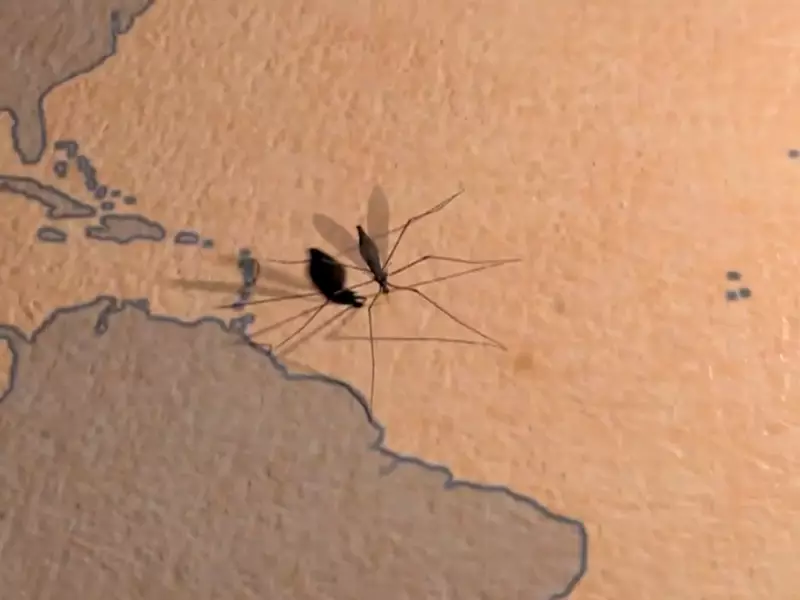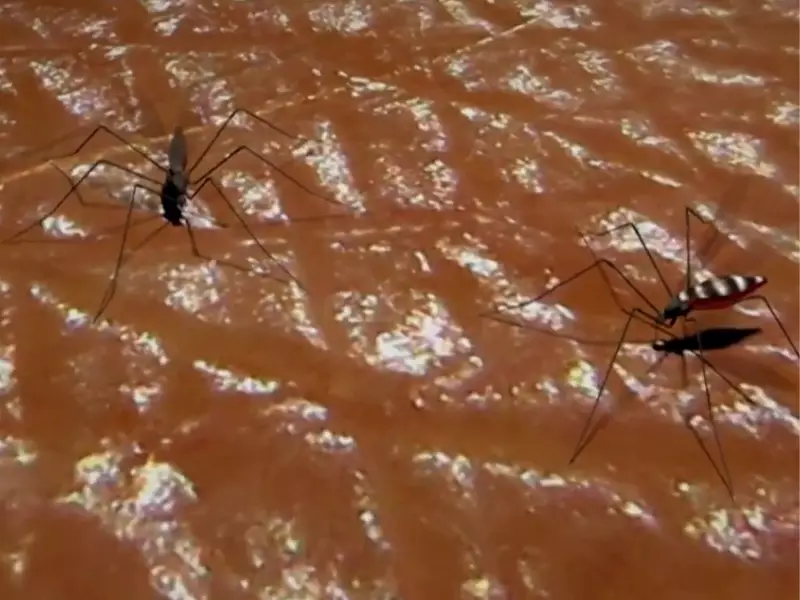Mosquitoes, often dismissed as mere nuisances, play a significant role in the ecosystem and, unfortunately, in the spread of various diseases. Among these tiny flyers, the dengue mosquito holds a particularly notorious reputation for its role in transmitting the deadly dengue fever, a major public health concern worldwide. Distinguishing between dengue mosquitoes and normal mosquitoes is not just a matter of curiosity but a crucial step in disease prevention and control.
The dengue mosquito, primarily Aedes aegypti, differs from other mosquitoes in several key aspects, including physical characteristics, breeding habits, and biting behavior. These mosquitoes are smaller, have distinct black and white markings on their bodies and legs, prefer to breed in clean, stagnant water, and are most active during the early morning and before dusk. Understanding these differences is essential for effective mosquito control and reducing the risk of dengue fever.
This topic is of critical importance, as the knowledge of these differences can empower communities to implement targeted prevention strategies. It’s not just about avoiding mosquito bites; it’s about understanding the enemy, in this case, the dengue mosquito, and taking informed steps to minimize its impact on human health.

Mosquito Basics
Types of Mosquitoes
Mosquitoes are more than just pests. They play a crucial role in ecosystems, but they can also spread diseases. Globally, there are over 3,500 species of mosquitoes, but they mainly fall into three genera that are significant to human health: Aedes, Anopheles, and Culex.
Common Varieties
- Anopheles Mosquitoes: Known for spreading malaria, these mosquitoes are found worldwide, especially in tropical regions.
- Culex Mosquitoes: Carriers of the West Nile virus, filariasis, and encephalitis. They are widespread across the globe.
- Aedes Mosquitoes: Notorious for transmitting viruses that cause dengue fever, Zika, chikungunya, and yellow fever. They are highly adaptive to urban environments.
Dengue Mosquito Specifics
The Aedes aegypti mosquito, often referred to as the dengue mosquito, is particularly adept at spreading the dengue virus. This species thrives in tropical and subtropical climates and has adapted well to human habitats, making it a significant public health threat.
Physical Differences
Size and Color
Mosquitoes vary in size, but dengue mosquitoes are generally smaller, about 4 to 7 mm in length. They have a distinctive black and white color pattern, which sets them apart from other mosquitoes, which are usually uniformly colored in shades of brown or gray.
Wing Patterns
Aedes aegypti mosquitoes have unique white markings on their wings and legs, a key identifier. In contrast, other mosquito species may have solid-colored wings without noticeable patterns.
Biting Habits
Dengue mosquitoes are daytime feeders, with peak activity during early morning and before dusk. This behavior contrasts with many other mosquito species, which are most active at night.
Dengue Mosquito Habitat
Breeding Grounds
Dengue mosquitoes prefer to lay their eggs in clean, stagnant water. Common breeding sites include:
- Flower pots
- Old tires
- Unused bottles
- Natural water collections, such as tree holes
Environmental Conditions
Warm temperatures and high humidity are ideal for dengue mosquito breeding. They thrive in environments where water collection is common and can breed in as little as a spoonful of water.
Geographic Distribution
Global Presence
While dengue mosquitoes are primarily found in tropical and subtropical regions, globalization and climate change are expanding their habitats. Today, they can be found in parts of the United States, Europe, and even in some temperate regions.
Dengue-prone Areas
Countries in Southeast Asia, Latin America, and Africa are highly prone to dengue outbreaks due to the pervasive presence of Aedes aegypti mosquitoes. Urban areas, with their abundance of breeding sites and dense populations, are particularly at risk.
Life Cycle
Understanding the life cycle of mosquitoes is crucial for implementing effective control measures.
Dengue Mosquito
- Egg Stage: Laid individually or in clusters on the water’s surface or just above it, these eggs can survive dry conditions for several months.
- Larva Stage: Once in water, eggs hatch into larvae, which feed on organic matter in the water.
- Pupa Stage: After several molts, larvae develop into pupae, the stage before becoming adult mosquitoes.
- Adult Stage: Adult mosquitoes emerge from pupae, ready to feed and mate.
Lifespan and Breeding: Aedes aegypti mosquitoes can live for about 2-4 weeks. Females can lay hundreds of eggs during their lifetime, often spreading them across multiple breeding sites to increase offspring survival chances.
Normal Mosquito
Comparing the life cycle of dengue mosquitoes with normal mosquitoes (such as Culex or Anopheles), the basic stages remain the same. However, there are differences:
- Breeding Habits: Many other species prefer different breeding environments, such as polluted water.
- Lifespan Variations: Some species have longer lifespans, enabling them to spread diseases over a wider area.

Biting and Behavior
Understanding the biting behavior and activity patterns of mosquitoes is crucial for effective prevention and control of mosquito-borne diseases.
Active Hours
Day vs. Night Activity
Mosquitoes exhibit varied activity patterns based on species. Dengue mosquitoes (Aedes aegypti) are primarily daytime feeders with peak activities during early morning and late afternoon. In contrast, many other species, such as those in the Culex genus, are more active at night.
Peak Biting Times
For dengue mosquitoes, the peak biting times are just after sunrise and before sunset. These times are crucial for implementing protective measures to avoid bites.
Attraction Factors
Carbon Dioxide and Body Heat
Mosquitoes are attracted to carbon dioxide and body heat, which humans and animals naturally emit. This attraction mechanism helps mosquitoes locate their food sources from a distance.
Colors and Scents
Bright colors and floral or fruity scents can also attract mosquitoes. Wearing light-colored clothing and avoiding strong perfumes or body lotions can reduce the risk of attracting mosquitoes.
Disease Transmission
Viruses and Diseases
Mosquitoes are vectors for numerous diseases, including dengue fever, Zika virus, chikungunya, yellow fever, and malaria. Dengue fever is specifically transmitted by the Aedes aegypti mosquito.
Dengue Fever Specifics
Dengue fever is characterized by high fever, severe headache, pain behind the eyes, joint and muscle pain, rash, and mild bleeding. It is crucial to seek medical attention if dengue is suspected.
Other Mosquito-Borne Illnesses
Besides dengue, mosquitoes transmit diseases like malaria, caused by Plasmodium parasites (Anopheles mosquitoes), and West Nile virus (Culex mosquitoes), highlighting the wide impact of these insects on public health.
Mechanism of Transmission
How Dengue is Spread
Dengue is spread when an Aedes mosquito bites a person infected with the dengue virus and then bites another person, transferring the virus. This cycle makes the mosquito an essential part of the dengue disease lifecycle.
Role of Mosquito in Disease Lifecycle
The mosquito acts as a disease vector, not just transferring the virus but also playing a crucial role in the virus’s life cycle, allowing it to replicate and spread.
Prevention and Control
Effective prevention and control of mosquito-borne diseases involve a combination of personal protection measures and community-wide efforts.
Personal Protection
Repellents and Clothing
Using insect repellent containing DEET, picaridin, IR3535, or oil of lemon eucalyptus on exposed skin and clothing can significantly reduce mosquito bites. Wearing long-sleeved shirts and long pants can also offer protection.
Mosquito Nets and Screens
Installing mosquito nets around beds and screens on windows and doors can help keep mosquitoes out of living spaces, especially during peak activity hours.
Environmental Management
Reducing Breeding Sites
Eliminating standing water in containers, such as buckets, bowls, and tires, can significantly reduce mosquito breeding sites around homes and communities.
Community Efforts and Support
Community-wide efforts, including regular cleanup drives to remove trash and clutter that can collect water, are crucial in controlling mosquito populations and reducing disease transmission.
Biological and Chemical Control
Natural Predators
Introducing natural predators of mosquitoes, such as fish that eat larvae, into water bodies can help control mosquito populations without harming the environment.
Insecticides and Larvicides
Using insecticides and larvicides can effectively reduce mosquito populations. However, these methods should be used judiciously to avoid resistance and environmental impact.
Frequently Asked Questions
What is a dengue mosquito?
A dengue mosquito refers to certain species of mosquitoes, primarily Aedes aegypti, known for their ability to transmit the dengue virus. These mosquitoes are identifiable by their distinctive black and white markings on their body and legs, and unlike many other mosquitoes, they are most active during the day.
How does a dengue mosquito transmit the disease?
Dengue mosquitoes transmit the disease through their bite. When a mosquito bites a person infected with the dengue virus, it can then carry the virus and transmit it to the next person it bites. This cycle continues, spreading the disease among the population.
Can normal mosquitoes transmit dengue?
While the primary transmitter of dengue is the Aedes aegypti mosquito, other mosquitoes can theoretically transmit the virus if they bite an infected person and then bite someone else. However, the likelihood and efficiency of transmission are significantly lower compared to Aedes aegypti.
How can we prevent dengue mosquito breeding?
Preventing dengue mosquito breeding involves eliminating their breeding sites by ensuring there are no areas of stagnant water around homes and communities. This includes covering water storage containers, properly disposing of waste, and regular cleaning of gutters and other areas where water may collect.
What are the peak biting times for dengue mosquitoes?
Dengue mosquitoes are most active during the early morning and before dusk. These are the times when they are most likely to bite, making it especially important to take preventive measures such as using mosquito repellent and wearing long-sleeved clothing during these hours.
Conclusion
Understanding the differences between dengue mosquitoes and normal mosquitoes is more than an academic exercise; it’s a vital component of public health strategies aimed at combating dengue fever. By recognizing the unique characteristics and behaviors of the dengue mosquito, individuals and communities can take targeted actions to reduce their risk of infection and contribute to broader efforts to control the spread of this disease.
The fight against dengue is a collective one, requiring informed participation from everyone. Awareness, education, and proactive prevention are key to minimizing the impact of dengue mosquitoes. As we continue to learn more about these vectors and the viruses they carry, our strategies for prevention and control will become even more effective, safeguarding the health and well-being of populations around the globe.
